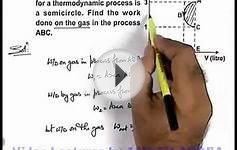Background: Problem-based learning (PBL) is a teaching approach working in cooperation with self-learning and involving research to solve real problems. The first law of thermodynamics states that energy can neither be created nor destroyed, but that energy is conserved. Students had difficulty learning or misconceptions about this law. This study is related to the teaching of the first law of thermodynamics within a PBL environment. Purpose: This study examined the effectiveness of PBL on candidate science teachers' understanding of the first law of thermodynamics and their science process skills. This study also examined their opinions about PBL. Sample: The sample consists of 48 third-grade university students from the Department of Science Education in one of the public universities in Turkey. Design and methods: A one-group pretest-posttest experimental design was used. Data collection tools included the Achievement Test, Science Process Skill Test, Constructivist Learning Environment Survey and an interview with open-ended questions. Paired samples t-test was conducted to examine differences in pre/post tests. Results: The PBL approach has a positive effect on the students' learning abilities and science process skills. The students thought that the PBL environment supports effective and permanent learning, and self-learning planning skills. On the other hand, some students think that the limited time and unfamiliarity of the approach impede learning. Conclusions: The PBL is an active learning approach supporting students in the process of learning. But there are still many practical disadvantages that could reduce the effectiveness of the PBL. To prevent the alienation of the students, simple PBL activities should be applied from the primary school level. In order to overcome time limitations, education researchers should examine short-term and effective PBL activities. (Contains 5 tables.)

Presentation Chapter 20 The First Law of Thermodynamics
You might also like


FAQ
What is the First law of thermodynamics?
First law of thermodynamics states that energy can be transformed (changed from one form to another), but cannot be created or destroyed. !
Biomechanical artists

H.R. Giger, whose horrific, biomechanical art-style defined the world of Alien and Prometheus , passed away yesterday from injuries suffered...
American Mechanical engineers

Advancing the science and practice of mechanical engineering is the responsibility of the Society s 37 Technical Divisions and Subdivisions...
Mechanical Engineering Design by Shigley

Details about Shigley s Mechanical Engineering Design: Shigley s Mechanical Engineering Design is intended for students beginning the study of...
Duties of Mechanical Engineer

Importance Knowledge Engineering and Technology - Knowledge of the practical application of engineering science and technology. This includes...
Jobs in Singapore for Mechanical Engineers

HP is a proven leader in personal systems and printing, delivering innovations that empower people to create, interact, and inspire like never...
It's Interesting
- Psychology (from Greek: ψυχή, psukhē, "spirit, soul"; and λόγος, logos, "knowledge") is an academic or applied discipline involving the scientific study of mental processes and behavior. Psychologists study such phenomena as perception, cognition, emotion...
- Psychology (from Greek: ψυχή, psukhē, "spirit, soul"; and λόγος, logos, "knowledge") is an academic or applied discipline involving the scientific study of mental processes and behavior. Psychologists study such phenomena as perception, cognition, emotion...
